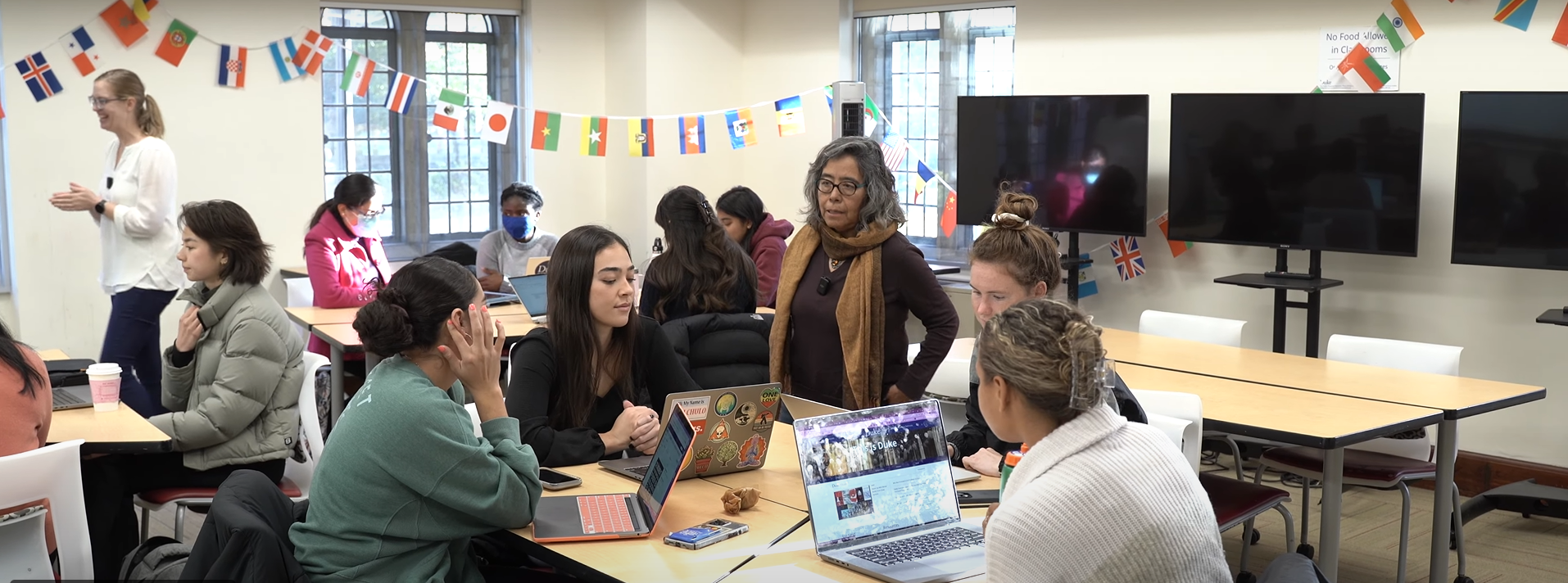Sandra Valnes Quammen A.M.’06 likes her students. She hopes they like her class back, she laughs.
Sponsored by Duke Alumni Engagement and Development for more than three decades, the Alumni Distinguished Undergraduate Teaching Award (ADUTA) is student-nominated and recognizes a Duke professor who excels as an educator and leader for students. For many students, their nominated professor made a difference in their lives beyond the classroom.
It’s safe to say they do.
Valnes Quammen is a senior lecturer within the Romance Studies department and director of the French Language Program. For 16 years, she’s taught countless courses and students, however, she does have a secret favorite. French 111 is an introductory class that can surprise students. Learning a new language places students in an atypical environment, a space where they are allowed to know nothing going into it.
“I was a beginner again.” Chaoran Yang ’26, the student who nominated Valnes Quammen, says. “I could make mistakes without the burden of constantly proving myself.”

That’s a burden Valnes Quammen has no interest perpetuating in her classes. In fact, the freedom to make mistakes and learn that it’s okay to not be an immediate expert is what makes the class her favorite. Duke students are enthusiastic about learning and familiar with articulating their knowledge in classes, but a new language can stump them, Valnes Quammen says. A space to build the confidence to take a few falls is key when learning any new or additional skill.
“It’s an endeavor that feels vulnerable and even scary, but I want my students to feel like they can take risks.”
In addition to being a lifelong educator, Valnes Quammen is a lifelong learner. For one class a week, French 111 and Spanish 111 partner together for “translanguaging” activities. “Translanguaging” is a concept Valnes Quammen and professor Liliana Paredes are researching to help students reach their full language potential. These classes blend French, Spanish and English together to provide a more holistic and communicative approach to language teaching, rather than memorization.
“I did not speak Spanish at all,” Yang says. “But the similarities helped me better understand French linguistically.”
The research between Valnes Quammen and Paredes has also inspired Yang to take “translanguaging” to a new level. Through her success in learning French, Yang wanted to help make Duke more multilingually accessible. For one of her class projects, her team created a website that translates financial jargon -- tuition, financial aid, etc. -- into Spanish, Chinese, Vietnamese, Arabic and French to help students and families whose first language isn’t English understand tuition and financial aid documents. As an international student herself, Yang is now collaborating with Duke International Student Center to make that information widely available for future students and families.
“Without inspiration from Professor Valnes Quammen, I would have never thought I was able to make this change.”
Today, Valnes Quammen continues to reimagine her courses, bringing in new teaching strategies and projects in tandem with her research in “translanguaging”. She also collaborates with colleagues in the French Language Program to explore how French language pedagogy and curriculum can be integrated with sustainability and equity initiatives. An ever-changing journey Valnes Quammen will never be fully fluent in.
